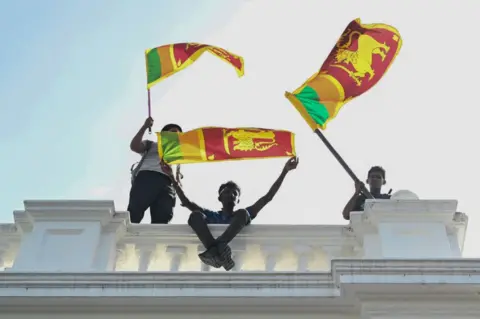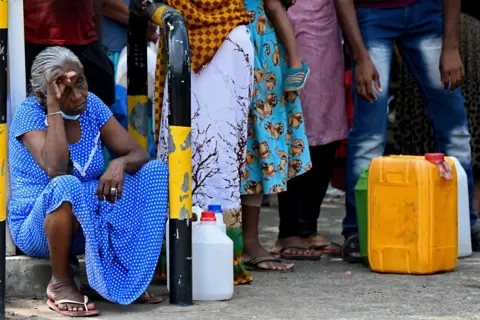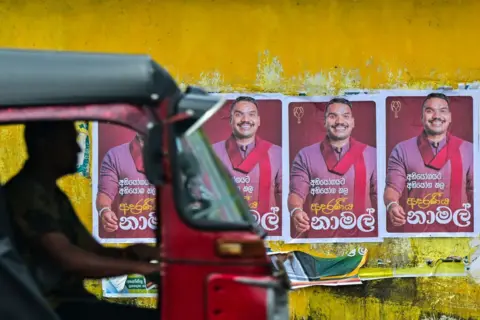 Getty Images
Getty ImagesSri Lankans are choosing a new president in the first presidential election since the current president was forced to step down in 2022 following mass protests triggered by the worst economic crisis in the country’s history.
Saturday’s vote is widely seen as a referendum on economic reforms aimed at putting the country on the road to recovery.
But many people still struggle to make ends meet due to rising taxes, cuts to benefits and cuts to welfare.
Many analysts predict that economic concerns will be a top priority for voters in this tightly contested election.
“With the country’s skyrocketing inflation, skyrocketing cost of living and poverty, voters are desperate for solutions to stabilize prices and improve their livelihoods,” Soumya Bhowmik, a researcher at the Observer Research Foundation, an Indian think tank, told the BBC.
“As the country struggles to emerge from economic collapse, these elections will be a critical moment in shaping Sri Lanka’s recovery trajectory and restoring confidence in governance at home and internationally.”
President Ranil Wickremesinghe, who has been tasked with guiding Sri Lanka out of economic collapse, is seeking re-election.
The 75-year-old was appointed by parliament a week after former President Gotabaya Rajapaksa was ousted from power.
Wickremesinghe crushed the remnants of the protest movement soon after taking office. He was also accused of shielding the Rajapaksa family from prosecution and allowing them to regroup, which he denies.
Another strong contender is left-wing politician Anura Kumara Dissanayake, whose anti-corruption policies have seen growing popular support.
Saturday’s election saw more candidates running than at any time in Sri Lanka’s history, but of the 30-plus, four stand out.
Besides Wickremesinghe and Dissanayake, there is also opposition leader Sajith Premadasa and 38-year-old Namal Rajapaksa, the nephew of the former president.
Counting of votes will begin when polls close at 4pm local time (10:30am GMT), but results are not expected until Sunday morning.
economy in crisis
The “Aragalaya” (struggle) uprising that ousted former President Gotabaya Rajapaksa was triggered by the economic collapse.
Years of undertaxation, weak exports and major policy mistakes, combined with the COVID-19 pandemic, have depleted the country’s foreign exchange reserves. Public debt has surpassed $83 billion and inflation has soared to 70%.
The country’s social and political elite were largely safe from radiation, but for ordinary citizens, shortages of basic goods such as food, cooking gas, and medicines led to increased anger and anxiety.
 Getty Images
Getty ImagesThen-President Rajapaksa and his government were blamed for the crisis, and protests demanding his resignation continued for months.
On July 13, 2022, in dramatic scenes broadcast around the world, a mob stormed the presidential palace, jumped into the swimming pool and ransacked the house.
After Rajapaksa left the country for 50 days, President Wickremesinghe’s caretaker government imposed strict austerity measures to rescue the economy.
Although economic reforms have successfully reduced inflation and strengthened the Sri Lankan rupee, the people of Sri Lanka are still struggling.
“The hardest part is finding a job,” said Yeshan Jayalath, 32. “Even with an accounting degree, I can’t get a full-time job.” Instead, he has been working temporary or part-time jobs.
Many small and medium-sized businesses across the country are still struggling.
Norbet Fernando, who had to close his roof tile factory north of Colombo in 2022, told the BBC that raw materials such as clay, wood and kerosene were three times more expensive than two years ago. Few people were buying roof tiles or building houses, he added.
“It’s heartbreaking to see the factories in ruins after 35 years,” Fernando told the BBC, adding that only 42 of the 800 tile factories in the area would be operating beyond 2022.
Central bank business sentiment data shows demand will be weak in 2022 and 2023. Things are improving in 2024, but still not back to pre-crisis levels.
“Sri Lanka’s economy may have recovered for now, but many citizens still need to be convinced that the price is worth it,” Alan Keenan, senior consultant for Sri Lanka at the International Crisis Group (ICG), told the BBC.
 Getty Images
Getty ImagesWho are the leading candidates?
Ranil Wickremesinghe: Having previously lost two presidential elections, he was given a third chance on Saturday to be elected by the Sri Lankan people rather than parliament.
Anura Kumara Dissanayake: The left-wing Kuomintang coalition candidate promised strong anti-corruption measures and selective governance.
Sajith Premadasa: The opposition leader represents the Samagi Jana Balawegaya party. His father served as Sri Lanka’s second executive president until he was assassinated in 1993.
Namal Rajapaksa: Mahinda Rajapaksa, the son of the late leader who led the country from 2005 to 2015, comes from a powerful political family but will have to win over voters who blame his family for the economic crisis.
How does voting work?
Voters in Sri Lanka rank up to three candidates in order of preference to select a single winner.
If a candidate receives an absolute majority, he or she is declared the winner. Otherwise, a second round of voting begins, where second and third-preference votes are considered.
In Sri Lanka, no election has ever gone to a second round because the first preference vote always resulted in a clear winner.
This year may be different.
“Polls and early signs of the campaign suggest this is likely to be the first election in history where a candidate will not win a majority of the vote,” said ICG’s Mr Keenan.
“Candidates, party leaders and election administrators must be prepared to handle any possible disputes calmly and in accordance with established procedures.”







